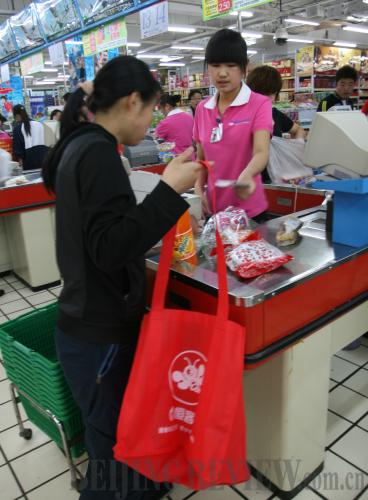|
 |
|
GREEN SHOPPING: A customer loads purchases into her own cloth bag in a supermarket in Changchun, Jilin Province, on June 1, 2008, the first day when the plastic shopping bag restrictions took effect (SHAO SHOUZHI) |
Li said supermarkets and department stores and many other large market places had stopped using ultra-thin plastic shopping bags, and the number of plastic shopping bags consumed in supermarkets and department stores was cut by two thirds, but in places such as farmers' markets, ultra-thin plastic shopping bags were still in use.
The restrictions on plastic shopping bags are aimed at curbing pollution caused by plastic waste. The NDRC said before the policy was implemented, plastic accounted for 3-5 percent of the total weight of waste buried each year, and most of this plastic waste was ultra-thin plastic shopping bags.
Experts say it takes more than 100 years for plastic bags to decompose. Plastic shopping bags scattered around are unpleasant to look at. Moreover, animals that eat them could starve to death if the plastic stays in their stomach. Plastic products can also release toxic materials into the environment, especially when heated to certain temperatures, and thus pose health hazards.
Since the ban took effect, the NDRC, the Ministry of Environmental Protection and the Ministry of Commerce have set up 10 inspection groups to supervise and monitor its implementation.
The NDRC said in the past three years, 2.4 million law enforcement personnel had been dispatched, who made 520,000 visits to retail outlets of varying sizes, more than 5,500 visits to plastic shopping bag manufacturers, and more than 8 million visits to vendors. A total of 2.15 billion substandard plastic shopping bags were confiscated and destroyed. And 129 workshops producing ultra-thin plastic shopping bags were shut down.
Plastic is produced from petroleum and consumes energy. In the past three years, plastic bag consumption in major retail outlets has been cut by 24 billion, translating to 600,000 tons of plastic, according to NDRC statistics. That is the equivalent of saving 3.6 million tons of crude oil or more than 5 million tons of coal, and more than 10 million tons of carbon dioxide emissions have been reduced.
Despite the policy's success in supermarkets, department stores and some other large market places, it has been largely ignored in small market places such as farmers' markets.
In many small markets, whatever customers buy, a large melon or a small leek, the vendors will put them in free plastic shopping bags, usually ultra-thin ones.
An ultra-thin shopping bag usually costs less than half the price of plastic shopping bags up to state standards, so vendors naturally prefer ultra-thin shopping bags to save money, reported People's Daily.
Dong Jinshi, an official with the Beijing Office of the International Food Packaging Association, said the effectiveness of the policy on curbing the use of plastic shopping bags had been waning. One year after the ban was implemented, ultra-thin plastic shopping bag consumption in farm produce wholesale markets was slashed by more than half, yet now, consumption has bounced back by more than 20 percent.
|
